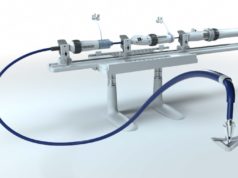
Edwards Lifesciences has announced it has made the “difficult decision” to discontinue its self-expanding transcatheter aortic valve implantation (TAVI) device Centera. The company says the resources required to “optimise deliverability as well as expanding the indications to match the Sapien 3 valve are significant”. Therefore, Edwards Lifesciences is to focus its resources on its Sapien 3 range of TAVI devices.
The withdrawal of Centera from the market follows a recent urgent field safety notice, issued by Edwards, about reports of difficulty tracking and manipulating the Centera valve. However, when announcing its decision to discontinue the valve, Michael A Mussallem (chairman and CEO of the company) suggested that the decision related more to the anticipated US FDA approval of Sapien 3 and Sapien 3 Ultra for the management of low-risk patients. He said: “Given the pending approval for patients at low surgical risk and the continued excellence and versatility of our balloon expandable platform, we made the difficult decision to discontinue the Centera programme. While the Centera valve has demonstrated excellent clinical outcomes and is performing well for patients, the time and resources required to optimise deliverability as well as expanding the indications to match the Sapien 3 valve are significant. Going forward, we believe we best address patient needs by focusing resources on our robust pipeline of next generation balloon expandable technologies and indication expansion trials.”
Furthermore, Mussallem reports that Edwards believes that the FDA will approve both Sapien 3 and Sapien 3 Ultra for low-risk patients in Q3 (1 July–30 September) of this year. “Over time, we expect Sapien 3 Ultra valve system will replace Sapien 3 valve globally,” he noted. Mussallem, however, did not comment on this week’s urgent safety notice for Sapien 3 Ultra.
Edwards Lifesciences revealed its plans for Centera in an overall report of its Q2 (1 April–30 June) results. This report also showed that, during Q2 2019, the company reported TAVI sales of US$678 million—an increase of 16% over the second quarter last year, or 18% on an underlying basis. Edwards grew in-line with estimated global procedure growth. Global average selling prices remained stable, and the company estimates its global competitive position was consistent with the first quarter and prior year.
“We are pleased to report stronger than expected sales growth in the second quarter, which continued a long-term trend of reaching more patients with innovative therapies and creating value. Increased demand for TAVI therapy resulted in underlying total company sales growth of 14%, which also reflected strength in all four of our product lines across all regions,” Mussallem commented.












